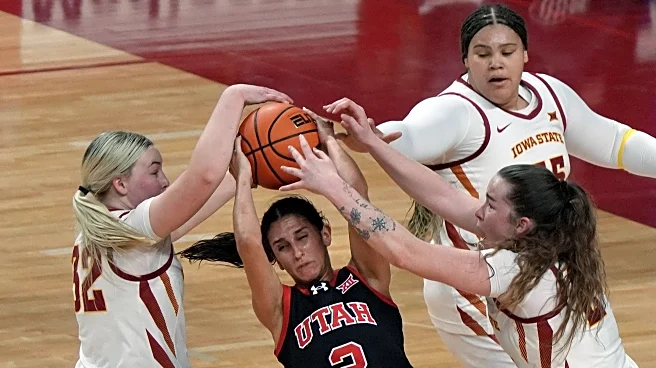What's Happening?
Bad Bunny, a prominent Puerto Rican singer, has made history by becoming the first Spanish-language artist to receive nominations in several top categories at the 68th Grammy Awards. His critically acclaimed album, 'Debí Tirar Más Fotos,' has earned him
nominations for Record of the Year, Album of the Year, and Song of the Year. Additionally, Bad Bunny is nominated for Música Urbana Album, Global Music Performance for 'EoO,' and Album Cover, a new category. This marks a significant achievement in his career, as he has previously won three Grammys out of ten nominations. The Grammy Awards ceremony is scheduled to take place on February 1 at L.A.'s Crypto.com Arena and will be broadcast live on CBS and streamed on Paramount+.
Why It's Important?
Bad Bunny's nominations highlight the increasing recognition and influence of Latin music in mainstream American music awards. His success underscores the growing diversity within the Recording Academy and the broader music industry. The inclusion of Spanish-language music in major categories reflects a shift towards a more inclusive recognition of global music trends. This development could pave the way for more Latin artists to gain visibility and acknowledgment in the U.S. music scene, potentially influencing the types of music that receive mainstream attention and commercial success.
What's Next?
The Grammy Awards will be held on February 1, where Bad Bunny will compete against other nominees in the Big Four categories. The outcome could further solidify his status as a leading figure in the music industry. Additionally, the increased participation of Latin Recording Academy members in the Grammy voting process may continue to influence future nominations and award outcomes, promoting a more diverse representation of artists and genres.
Beyond the Headlines
The recognition of Bad Bunny and other Latin artists at the Grammys may have broader cultural implications, encouraging more cross-cultural collaborations and the blending of musical styles. This could lead to a richer and more varied music landscape, reflecting the diverse backgrounds and experiences of artists worldwide. Furthermore, it highlights the importance of cultural representation in media and entertainment, potentially inspiring other industries to embrace diversity and inclusivity.

















